#Inclusive Politics
Text
Shoutout to all the people of Ohio who just passed abortion, contraception, and reproductive rights of all people into constitutional law by a fucking 12+ point margin despite the state legislature desperately trying to do everything they can to fuck up the vote. I'm so proud of y'all!!
Edit: Trans people fucking rule, sex work is cool and deserves respect, sex isn't a binary, gender critical theory is based on terrible disproven science and is just Phrenology for sex.
#sif speaks#us politics#election 2023#it's very well written and extremely clear on it's inclusion#abortion mention#abortion rights#post editted for getting terfs to clear the fuck off
21K notes
·
View notes
Text
Bridging the Divide:
Combating Partisan Polarization in American Politics
In the realm of American politics, a shadow looms large – a shadow cast by the growing chasm of partisan polarization. As our nation grapples with complex challenges and opportunities, the stark divide between political parties threatens to stifle progress and compromise. In this blog post, we delve into the depths of this issue and explore potential strategies to bridge the gap and combat the corrosive effects of partisan polarization.
The Roots of Partisan Polarization
Partisan polarization isn't a new phenomenon, but its intensity and impact have become increasingly evident in recent years. Rooted in a multitude of factors, including ideological differences, media echo chambers, and gerrymandered districts, this polarization has created an environment where collaboration takes a back seat to confrontation.
The Consequences of Polarization
The consequences of partisan polarization are far-reaching. Legislative gridlock, where policy-making grinds to a halt due to an inability to find common ground, has become all too familiar. Public trust in institutions erodes as citizens witness their elected officials engaged in seemingly endless ideological battles, often at the expense of meaningful governance. Moreover, polarization can hinder innovative solutions to pressing issues, leaving critical problems unresolved.
Combating Partisan Polarization: Strategies for Unity
While the challenge of partisan polarization is daunting, it is not insurmountable. Here are some strategies that could help bridge the divide and promote more constructive dialogue and cooperation:
Promote Civility and Respect: Leaders from both sides of the aisle must set an example by engaging in civil and respectful discourse. Constructive debates and disagreements can lead to better solutions, but they should be grounded in mutual respect and a commitment to finding common ground.
Encourage Cross-Party Collaboration: Establish platforms and initiatives that encourage members of different parties to work together on shared goals. Cross-party alliances can demonstrate the potential for compromise and foster a culture of cooperation.
Foster Media Literacy: Educating citizens about media literacy can help counter the echo chamber effect, where individuals are exposed only to information that reinforces their existing beliefs. Encouraging critical thinking and a diverse range of news sources can lead to a more informed and well-rounded public discourse.
Address Gerrymandering: Redistricting reform can help mitigate the impact of gerrymandered districts, which often contribute to polarization by creating safe seats for one party or the other. Independent commissions and transparent processes can lead to more competitive elections and encourage candidates to appeal to a broader spectrum of voters.
Promote Civic Engagement: Encouraging citizens to actively participate in the political process can help counter apathy and disengagement. When people are actively involved, they become more invested in finding common ground and advocating for solutions that benefit everyone.
A Shared Responsibility
The task of combating partisan polarization is not solely the responsibility of politicians or policymakers. It is a collective effort that requires the engagement of citizens, communities, and institutions across the nation. By recognizing the dangers of polarization and committing to fostering a more inclusive and collaborative political environment, we can work toward a future where the United States thrives through unity, understanding, and progress.
In conclusion, while the challenge of partisan polarization is significant, it is not an insurmountable obstacle. By embracing a spirit of cooperation, promoting civility, and fostering a culture of open dialogue, we can begin to heal the divisions that threaten our democracy. Let us remember that the strength of our nation lies not just in our differences, but in our ability to come together for the greater good.
#Partisan Polarization#Political Divisions#Bipartisanship#Civic Engagement#Cross-Party Collaboration#Legislative Gridlock#Media Literacy#Gerrymandering#Unity in Politics#Political Discourse#Civility and Respect#Redistricting Reform#Democracy#Inclusive Politics#Public Trust#Political Compromise#Media Influence#Political Reconciliation#Constructive Dialogue#Common Ground
0 notes
Text
Tumblr stop recommending me horny sapphic blogs that all say men dni in the pinned post, go back to sending me posts from the one that's just horny all the time please, I want the fat furries and the queer freaks that are way less respectably normal about me and my body.
#long post#feels weird to have this tagged important although I'm glad it resonates with many different trans people#dni lists are generally useless and rarely seen but i see all the saph ones bc I'm checking they're not terfs and its weird#but its just always weird bc they always are trans inclusive binary exclusionist and its like what are you doing#anyway its pretty much all an online thing but weird insight into the whole neoliberal gender politics#trans inclusive politics that still fundamentally are binary exclusively in action
7K notes
·
View notes
Text
Medical racism isn't important to address just because it's mean to be racist to patients (I mean, it is mean), but because medical racism kills people. It contributes to systemic suffering of those deemed non-white, and the disinformation that spreads about non-white people.
#politics#racism#racism tw#medical racism tw#i've noticed my modern medical textbooks are trying to be more explicitly includive (objectively good)...#...but i don't think it should stop there. in fact i worry sometimes that people will see broad inclusion...#...as the only goal to achieve when i think more active measures should be taken to address and fix the inherent problems of racism#medical racism isn't the only kind of racism obviously but man... hearing the stories about those who faced it terrify me#it's a nightmare to think about and i can't express just HOW important it is to vehemently oppose letting it fester#something i've noticed because again my textbooks make more of an effort...#...but then i got to a lab and only one of those expensive human models weren't white and like. it's a little thing but it makes me think
320 notes
·
View notes
Note
I saw your tags on the post about trick or treaters not speaking and I am v interested in hearing more of your thoughts on the concept of “developmental delays”! I‘ve seen the idea that disability is a construct, but I’m not as familiar with the idea that development is also a construct. You have really great takes as an educator and someone who like, actually GETS how kids work, so I am interested in your thoughts!
I also know that posting on this subject might be poking the bear, so it is 1000% cool if you would rather not comment 💜 Tysm!
Oh I'm happy to talk about it! I love talking about this stuff, thank you for asking me to 💙
This isn't exactly new ground; there's been plenty of research into and writing on the subject, and deconstructing "development" as a static concept was, ironically, a huge part of my most recent development class.
The idea is that our understanding of "benchmarks" of development, which informs the larger concept of development as a whole, is heavily rooted in the assumption that Western culture is The Standard. We prioritize walking, talking, reading, and writing, which means we cultivate these skills in our children from a young age, which means they develop those skills more quickly than they do others.
To use one of my favorite examples from Rogoff, 2003, Orienting Concepts and Ways of Understanding the Cultural Nature of Human Development:
Although U.S. middle-class adults often do not trust children below about age 5 with knives, among the Efe of the Democratic Republic of Congo, infants routinely use machetes safely (Wilkie, personal communication, 1989). Likewise, Fore (New Guinea) infants handle knives and fire safely by the time they are able to walk (Sorenson, 1979). Aka parents of Central Africa teach 8- to 10-month-old infants how to throw small spears and use small pointed digging sticks and miniature axes with sharp metal blades:
"Training for autonomy begins in infancy. Infants are allowed to crawl or walk to whatever they want in camp and allowed to use knives, machetes, digging sticks, and clay pots around camp. Only if an infant begins to crawl into a fire or hits another child do parents or others interfere with the infant’s activity. It was not unusual, for instance, to see an eight month old with a six-inch knife chopping the branch frame of its family’s house. By three or four years of age children can cook themselves a meal on the fire, and by ten years of age Aka children know enough subsistence skills to live in the forest alone if need be. (Hewlett, 1991, p. 34)" (pg. 5)
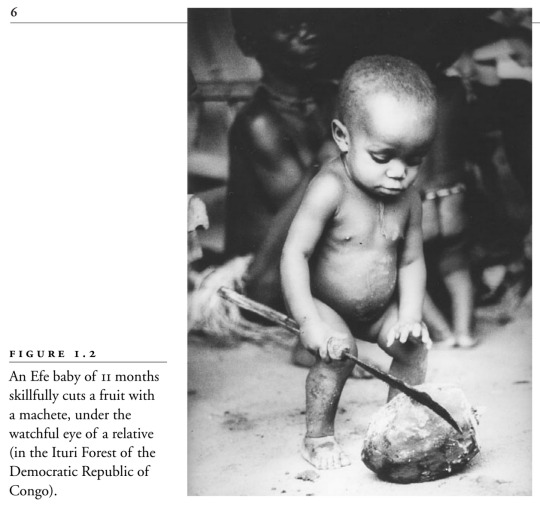
In the US we would view "letting an 8-month-old handle a knife" as a sign of severe neglect, but the emphasis here is placed on the fact that these children are taught to do these things safely. They don't learn out of necessity, or stumble into knives when nobody is watching; they learn with care, support, and safety in mind, just like children here learn. It makes me wonder if Aka parents would view our children's lack of basic survival skills with the same concern and disdain as USAmerican parents would view their children's inability to read.
Do we disallow our children from handling knives because it is objectively, fundamentally unsafe for a child of that age to do so- because even teaching them is developmentally impossible- or is that just a cultural assumption?
What other cultural assumptions do we have about child development?
Which ties in neatly with various social-based models of disability, particularly learning and, of course, developmental disabilities. If your culture doesn't value the things you are good at, and you happen to struggle with the things it does value, what kinds of assumptions is it likely to make about you? How will it pathologize you? What happens to that culture if it understands those values to be arbitrary, in order to accommodate your unique existence?
#education#childcare#disability#ftr I am specifically saying that it adds an important and interesting dimension to models of disability based on the social model#because disability is a complex combination of social/cultural and legitimately limiting factors that people to this day#are still trying to define in an inclusive and effective way#(and probably will be forever because it's so tied up in social/cultural and political stuff)#I dont want to imply that disability is 100% entirely made up- but it also isn't 100% entirely 'objective physical reality' or whatever.#its complicated. ill have better thoughts when im not just like 5 weeks into my first disability studies class lmao
174 notes
·
View notes
Text
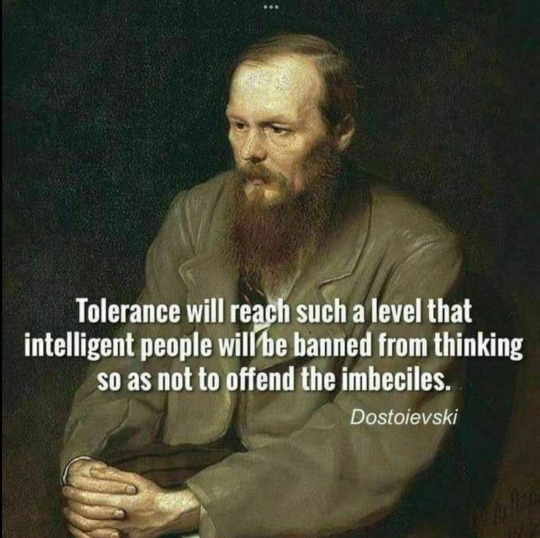
💯💯💯
#tolerance#acceptance#inclusiveness#inclusion#loss of common sense and self preservation#stupidity#the abnormal becomes the new normal#degradation of culture#indoctrination#mind control#political correctness#speak up#stand up for what’s right#standup#fight for justice#speaktruth#truth#please share#wwg1wga
192 notes
·
View notes
Text
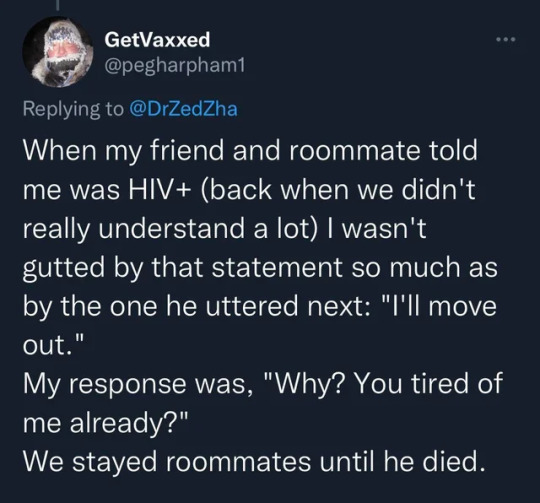
#hiv/aids#aids#aids crisis#aidsday2022#aids activism#aids history#hiv#queer history#respectability politics#lgbtq history#radical inclusivity#radical acceptance#radical red#radical feminism#radical self love#radical feminists please touch#radical queer#radical history#radical eco thug spared jail after pouring poo on memorial to captain tom moore#rights
767 notes
·
View notes
Text



#brandon scott#francis scott key bridge collapse#baltimore mayor#racist attacks#diversity equity inclusion#wes moore#baltimore politics#political criticism#city leadership#baltimore community#urban challenges#racial discrimination#political backlash#community activism#baltimore bridge collapse#infrastructure disaster#francis scott key bridge#construction accident#rescue operations#salvage effort#port of baltimore#supply chains#federal government#reconstruction cost#insurance claims#liability
51 notes
·
View notes
Text

As Elon Musk whines about imaginary reverse discrimination against white men and “unqualified” women + non-white people being hired into jobs that they are neither deserving of nor qualified for (according to Apartheid Clyde, the privileged nepo baby born into wealth), please keep in mind that the pilot who landed Alaska Airline flight 1282 is a woman.

In a transcript of the conversation between the pilot — who so far remains anonymous — and the control tower, we get a glimpse into how she managed to rest cool, calm and very collected.
During the incident the cabin had become depressurized when a part of its structure blew out. As a result passengers’ phones were sucked out of the plane, and a teenager’s shirt was torn off his back.
While the passengers were left in a terrifying position, no doubt fearing the worst, the plane’s pilot kept things calm.
Grace under pressure
In the transcript published by IAM14 that you can listen to here, the pilot displays zero panic. In fact, she needed to be asked if she were declaring an emergency!
Here’s a snippet:
Air traffic controller: “1282 foreign approach. Good afternoon. You still have information zero?”
Alaska Airlines pilot: “Yeah, we do have information zero, we’d like to get lower, if possible.”
Air traffic controller: “Possibility 1282 descend and maintain 7,000.”
Air traffic controller: “Alaska 1282 did you declare an emergency or did you need to return to …”
Alaska Airlines pilot: “Yes, we are in an emergency, we are depressurized, we do need to return back to, we have 177 passengers. Fuel is 18-eight.”
When she states: “We’d like to get lower, if possible,” most people would have had a slightly different reaction. It would have been understandable to hear something along the lines of: “Help, we’re in big trouble!” (source)
And remember: there are also Black pilots who do the job every single day, not to mention the intersection of other marginalized groups who are also right there doing the damn thing.
#politics#elon musk#diversity equity and inclusion#apartheid clyde#dei#alaska airlines#alaska airlines 1282
53 notes
·
View notes
Text
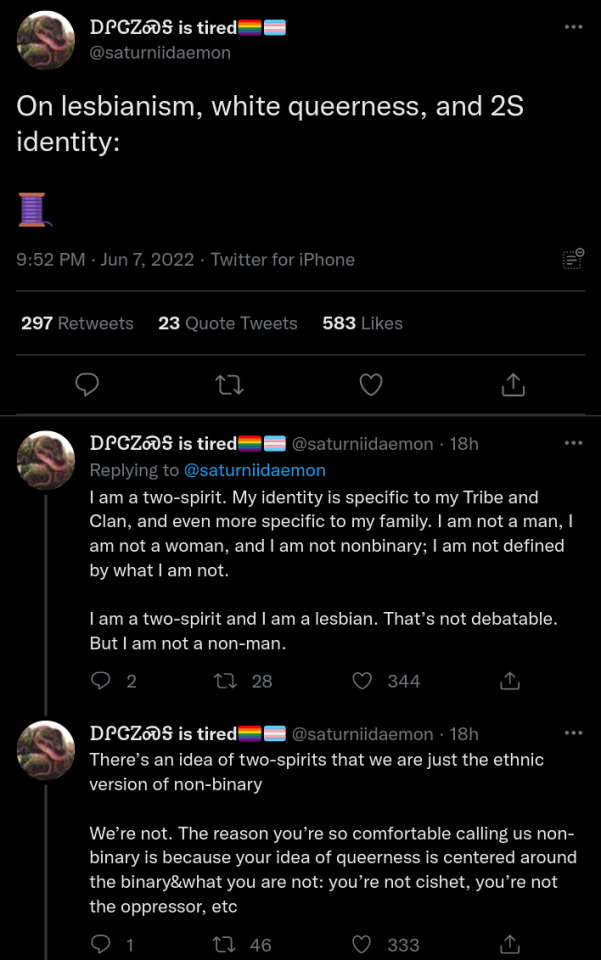
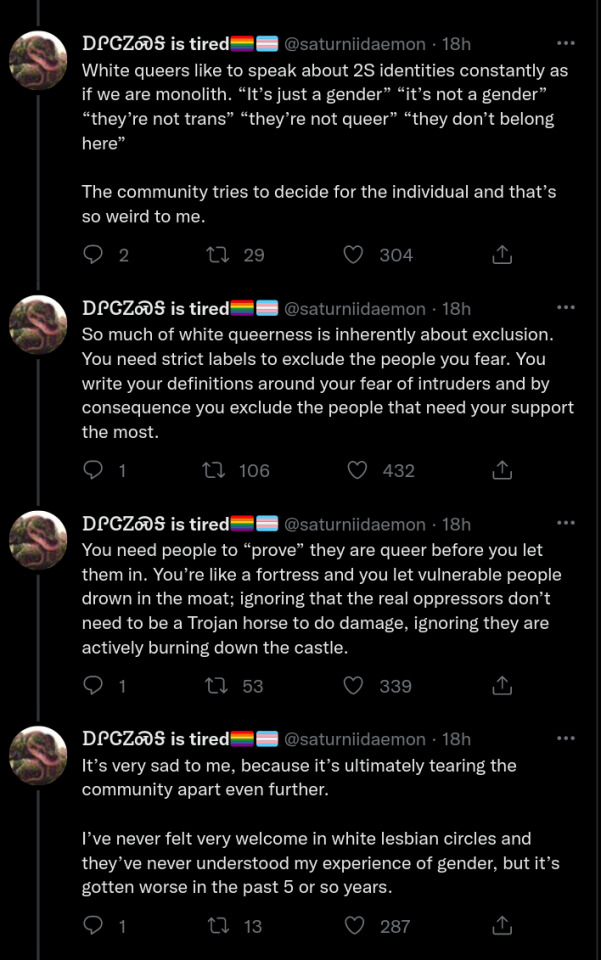
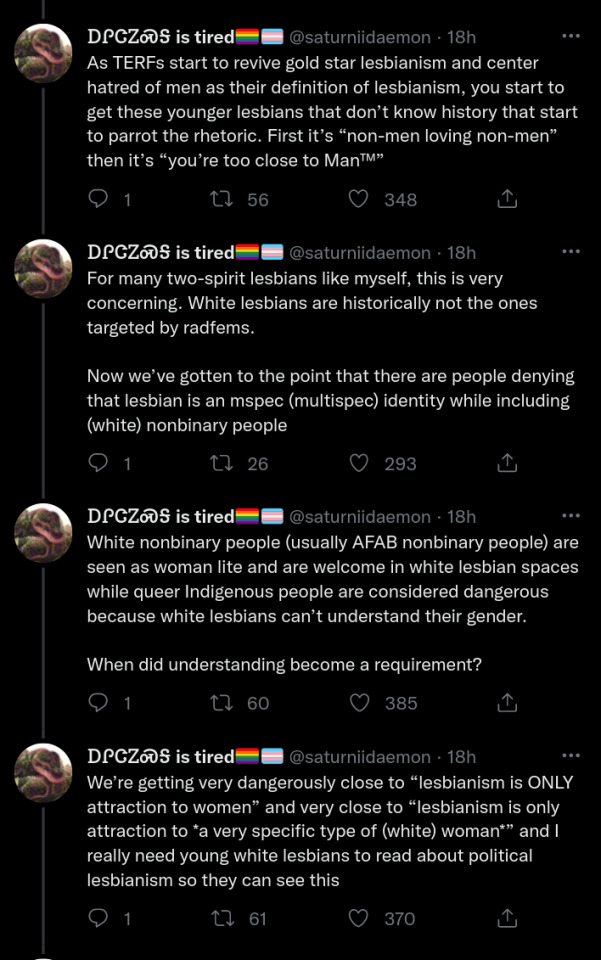


So apparently it’s that time of year again where I have to post about this.
On lesbianism, white queerness, and 2S identity
Text below readmore
I am a two-spirit. My identity is specific to my Tribe and Clan, and even more specific to my family. I am not a man, I am not a woman, and I am not nonbinary; I am not defined by what I am not.
I am a two-spirit and I am a lesbian. That's not debatable.
But I am not a non-man.
There's an idea of two-spirits that we are just the ethnic version of non-binary
We're not. The reason you're so comfortable calling us nonbinary is because your idea of queerness is centered around the binary&what you are not: you're not cishet, you're not the oppressor, etc
White queers like to speak about 2S identities constantly as if we are monolith. "It's just a gender" "it's not a gender"
"they're not trans" "they're not queer" "they don't belong here"
The community tries to decide for the individual and that's so weird to me.
So much of white queerness is inherently about exclusion.
You need strict labels to exclude the people you fear. You write your definitions around your fear of intruders and by consequence you exclude the people that need your support the most.
You need people to "prove" they are queer before you let them in. You're like a fortress and you let vulnerable people drown in the moat; ignoring that the real oppressors don't need to be a Trojan horse to do damage, ignoring they are actively burning down the castle.
It's very sad to me, because it's ultimately tearing the community apart even further.
I've never felt very welcome in white lesbian circles and they've never understood my experience of gender, but it's gotten worse in the past 5 or so years.
As TERFs start to revive gold star lesbianism and center hatred of men as their definition of lesbianism, you start to get these younger lesbians that don't know history that start to parrot the rhetoric. First it's "non-men loving non-men" then it's "you're too close to Man™"
For many two-spirit lesbians like myself, this is very concerning. White lesbians are historically not the ones targeted by radfems.
Now we've gotten to the point that there are people denying that lesbian is an spec (multispec) identity while including (white) nonbinary people
White nonbinary people (usually AFAB nonbinary people) are seen as woman lite and are welcome in white lesbian spaces while queer Indigenous people are considered dangerous because white lesbians can't understand their gender.
When did understanding become a requirement?
We're getting very dangerously close to "lesbianism is ONLY attraction to women" and very close to "lesbianism is only attraction to *a very specific type of (white) woman*" and I really need young white lesbians to read about political lesbianism so they can see this
I don't want to hear "not all lesbians" or "well then they aren't welcome" because every time this rhetoric goes unchallenged you are actively welcoming these people to continue it and make it more and more extreme. Yes, even the kind that seems to have nothing to do with racism
Almost all of your exclusionary rhetoric is based on the racist ideas of political lesbianism and I do not know why you all cannot see that they want to move goalposts. It wasn't just bi lesbians, it wasn't just he/him lesbians, it wasn't just nonbinary lesbians. It's a tactic.
It really feels like young lesbians are not only letting us go backwards, but encouraging it. And that's thanks in part to the historical racism of political lesbianism, but many of these people ARE old enough to think critically and talk to people who've been through this.
So far I've seen this in younger lesbian spaces; the ones with older generations (the ones that don't welcome TERFs) have been pretty welcoming even if not totally understanding, because they at least recognize that you don't need to understand someone's experience to validate it.
But I'm really concerned for the young Indigenous lesbians who don't feel comfortable around older people and are going to these younger lesbian spaces only to be indoctrinated with thinly veiled TERF rhetoric. It makes me very concerned for our spaces as well.
So I'll say again
I am not a non-man and I am not a non-woman. I'm not defined by what I am not. I do not ascribe to your binary-centric definitions of queerness. I experience queer attraction to women. I'm a lesbian. You do not get to use community to decide my individuality.
Thread by ~Alitsanosga
Pronouns: hi'a/vsgina/utseli/uwasa
#two spirit#two-spirit#2slgbtqia+#2 spirit#lesbian#white queers#white queerness#racism#colonialism#political lesbianism#inclusion is survival#indigeneity#indigenous rights
70 notes
·
View notes
Text
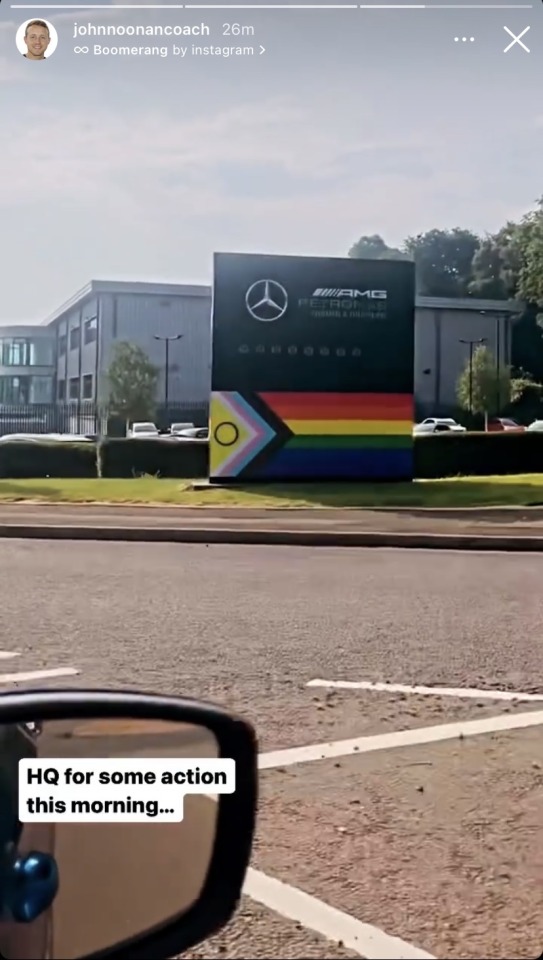
Merc have put up a progress + intersex pride flag outside their HQ in Brackley for Pride
(source: John Noonan-personal coach to Mercedes junior Frederik Vesti)
#mercedes amg petronas#Mercedes amg#mercedes amg f1#brb gonna go cry into my own fists#yeah it’s a corporation yeah rainbow capitalism whatever#I just- I’m so desperate to be safe these days in the U.K.#to be told trans people matter and are so fucking normal corporations feel like they can profit from us#shit I want to be normal I don’t want to be political talking point#it’s the most inclusive flag they could put up and it fucking matters okay
200 notes
·
View notes
Text
I’m so fucking tired of hearing news sites explain how higher education levels are linked with voting a particular way, but then treating it as some isolated fun fact and never asking why. Like the ABC discusses how higher education is a huge predictor of voting yes to the voice, and then it just leaves it at that.
WHY DO YOU THINK THAT IS, HUH? I wonder why having more knowledge, more exposure to other views, and more critical thinking skills makes you do things like support the voice and support progressive policies???? I wonder what that says about the opposite, that you tend to be less educated to support conservative causes??? Gee, isn’t it a fucking MYSTERY??
#孟珏 life talk#voice to parliament#auspol#Australia#obviously this isn’t about access and equity issues#that’s a whole other problem#but I’m sick of no one asking why education might make you think critically about how society should be inclusive#and why conservative politics relies so much on a lack of education in its supporters
78 notes
·
View notes
Text
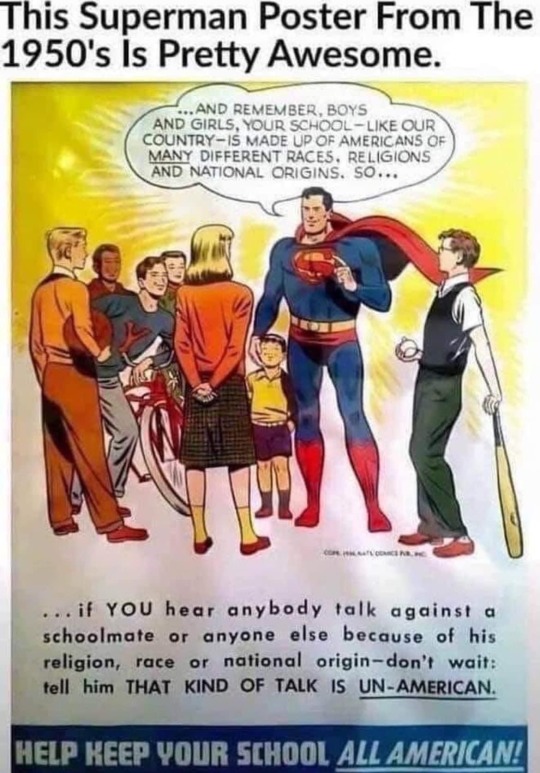
#Superman#old comics#golden age#silver age comics#1950s#classic#ye olde meme#ye olde internet#intersectionality#all american#as American as apple pie#comic books#family#American values#USA#usamerica#us America#America#us#us politics#wokeness#woke liberal madness#woke#transrights#lgbtqia#gay rights#lgbtq+#immigrants#inclusion#racial integration
29 notes
·
View notes
Text
Here's the thing about politics, and ultimately, the world: you are going to be biased, and you are going to have a limited understanding of others to an extent. The key is to not deny that this exists because you will be ignorant when you are biased and limited in your worldview.
Yes, absolutely listen to multiple voices and points of view and a variety of different types of people. But know that this isn't the same as erasing all biases and "self-centered" views. Strive to do better without denying that you are fallible.
#politics#this is how growth happens too#it is natural to be almost self-centered because you both live with yourself but also view the world as a self/selves#and it IS better to strive to remember inclusivity and sensitivity but that doesn't mean that you will NEVER betray those goals...#...and that's not because you are Bad Person Number One but rather because you are fallible...#...you will try your best and sometimes fall flat on your face regardless. that's the POINT of being alive...#...what you do is recognize that you're fallible and learn how you fumbled and remember that for next time...#...arm yourself with that knowledge and you will be better for it.#you can never reach this magical point where you Never Do Wrong because that Doesn't Exist#so what you do is learn. and keep learning. and challenging yourself. and not blame yourself for being an Actual Person#i would rather somebody stumble but ultimately mean well and actually learn than somebody who assumes that...#...'oh well because i say i believe and do Good Things that means i'll NEVER do ANYTHING bad EVER'#inspired by me realizing that a question i had stemmed from a limited worldview because i live As Me and don't know anything else truly#even i am fallible much to my chagrin (lighthearted)
103 notes
·
View notes
Text
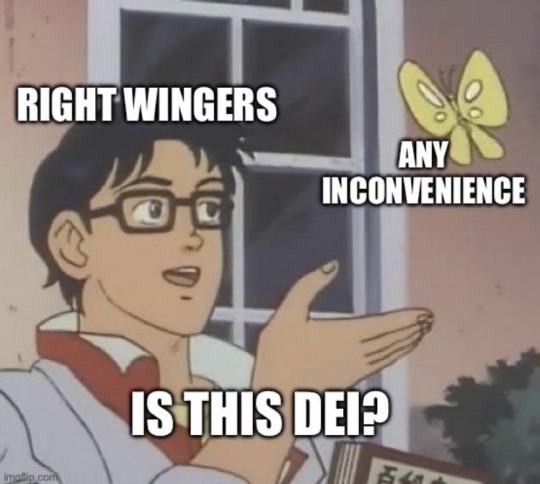
#tumblr memes#meme#memes#political memes#political humor#political shitposting#leftist memes#fuck conservatives#meme humor#dei#diversity equity and inclusion#humor#humour#funny but true#funny because it's true#true memes#lol#lol memes#shitpost#dank memes#dank humor#dankest memes#funny#funny shit#ha ha funny#funny memes#funny meme haha#funny meme xd#funny post#funny stuff
28 notes
·
View notes
Text
Queer family is me and my husband who met at our school's LGBTQIA+ Alliance in college.
Queer family is my boyfriend who got ordained so he could officiate his partners' wedding.
Queer family is our household, which consists of three people who are in love with each other and building a life together with two dogs and two cats.
Queer family is my friend and former lover taking a week off graduate school in Australia and flying across the world twice in one week so she could be at our wedding in person.
Queer family is setting aside a bedroom for our asexual friend to make it clear she will always have a space in our home.
Queer family is our fridge stocked with soy milk and vegan butter because one of our friends is allergic to dairy.
Queer family is my biological siblings who are also queer and who thankfully had a much easier time coming out than I did.
Queer family is planning a baby shower for my nonbinary friend to help them pay for baby clothes, cribs, diapers, etc.
Queer family is the homes and communities we build for ourselves and each other.
Queer family is the ancestors who went before, who dedicated their lives to building a future where I could safely live as an openly queer person.
Queer family is the children I will help raise, whether I'm their parent or not, who will hopefully live in a more accepting world than I do.
Queer family is the descendants I will never meet, who will experience gender and sexuality in ways I can't even imagine.
Queer family is strong.
Queer family is powerful.
Queer family is beautiful.
#having Feelings about love and found family today#queer family#found family#queer#lgbtq+#lgbt#polyamory#queer community#queer politics#queer pride#mine#this post is trans inclusive#terfs fuck off#terfs dni#genderqueer#nonbinary
87 notes
·
View notes